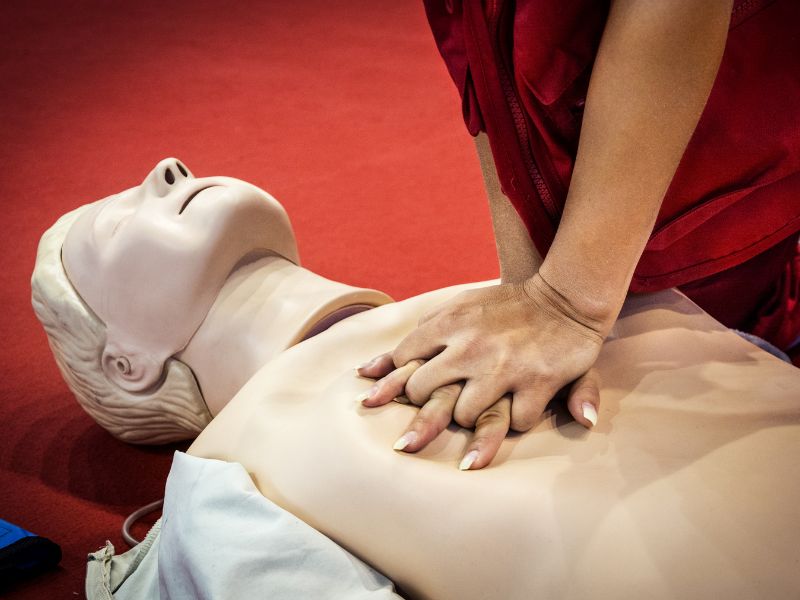
What Is CPR?
It’s The Difference Between Life and Death.
Half a million cardiac arrests occur annually and CPR can increase the chance of survival. It’s not limited to healthcare workers and emergency responders, as bystander CPR can double or triple the chance of survival. Save Life Jodhpur offers training to ensure you are equipped to confidently and effectively perform CPR in crucial moments.

What Is CPR?
It’s The Difference Between Life and Death.
Half a million cardiac arrests occur annually and CPR can increase the chance of survival. It’s not limited to healthcare workers and emergency responders, as bystander CPR can double or triple the chance of survival. Save Life Jodhpur offers training to ensure you are equipped to confidently and effectively perform CPR in crucial moments.

Why CPR is important?
CPR (Cardiopulmonary Resuscitation) is important because it can save someone’s life in an emergency situation when their heart has stopped beating or they have stopped breathing. CPR helps to maintain blood flow and oxygen supply to vital organs, including the brain, until medical help arrives. By performing CPR, bystanders can potentially double or triple the chances of survival for the person in need. Therefore, learning CPR can equip individuals with the skills to act quickly and confidently in an emergency, potentially saving a life.

Why CPR is important?
CPR (Cardiopulmonary Resuscitation) is important because it can save someone’s life in an emergency situation when their heart has stopped beating or they have stopped breathing. CPR helps to maintain blood flow and oxygen supply to vital organs, including the brain, until medical help arrives. By performing CPR, bystanders can potentially double or triple the chances of survival for the person in need. Therefore, learning CPR can equip individuals with the skills to act quickly and confidently in an emergency, potentially saving a life.


Why First 3 Minutes are Important?
1. The probability of receiving medical help within the first 3 minutes is very low. Emergency medical services and ambulances cannot reach within the first 3 minutes, when CPR can save a life.
2. CPR helps maintain blood flow, which reduces damage to vital organs of the patient.
3. If CPR is not given within the first 3 minutes, the brain may not receive oxygen and blood supply, which can cause significant damage and even lead to coma.
4. Giving CPR increases the chances of survival and recovery for people who suddenly experience cardiac arrest.
2. CPR helps maintain blood flow, which reduces damage to vital organs of the patient.
3. If CPR is not given within the first 3 minutes, the brain may not receive oxygen and blood supply, which can cause significant damage and even lead to coma.
4. Giving CPR increases the chances of survival and recovery for people who suddenly experience cardiac arrest.

Why First 3 Minutes are Important?
1. The probability of receiving medical help within the first 3 minutes is very low. Emergency medical services and ambulances cannot reach within the first 3 minutes, when CPR can save a life.
2. CPR helps maintain blood flow, which reduces damage to vital organs of the patient.
3. If CPR is not given within the first 3 minutes, the brain may not receive oxygen and blood supply, which can cause significant damage and even lead to coma.
4. Giving CPR increases the chances of survival and recovery for people who suddenly experience cardiac arrest.
2. CPR helps maintain blood flow, which reduces damage to vital organs of the patient.
3. If CPR is not given within the first 3 minutes, the brain may not receive oxygen and blood supply, which can cause significant damage and even lead to coma.
4. Giving CPR increases the chances of survival and recovery for people who suddenly experience cardiac arrest.


When CPR can be given ?
1 . Heart Arrest
2 . Electrocution
3 . Drowning
4 . Stroke
5 . Suffocation
6 . Smoke Inhalation
7 . Severe Allergic Reaction
8 . Drug Overdose
9 . Foreign body airway obstruction
2 . Electrocution
3 . Drowning
4 . Stroke
5 . Suffocation
6 . Smoke Inhalation
7 . Severe Allergic Reaction
8 . Drug Overdose
9 . Foreign body airway obstruction

When CPR can be given ?
1 . Heart Arrest
2 . Electrocution
3 . Drowning
4 . Stroke
5 . Suffocation
6 . Smoke Inhalation
7 . Severe Allergic Reaction
8 . Drug Overdose
9 . Foreign body airway obstruction
2 . Electrocution
3 . Drowning
4 . Stroke
5 . Suffocation
6 . Smoke Inhalation
7 . Severe Allergic Reaction
8 . Drug Overdose
9 . Foreign body airway obstruction

Get in touch
Come and visit our quarters or simply send us an email anytime you want. We are open to all suggestions from our audience.
Address
27th Avenue,
W2 3XE, New York
W2 3XE, New York
Call us
0-800-777-2331
0-800-772-3466
0-800-772-3466
Write us
office@medicare.com
book@medicare.com
book@medicare.com


